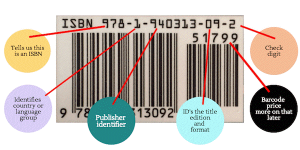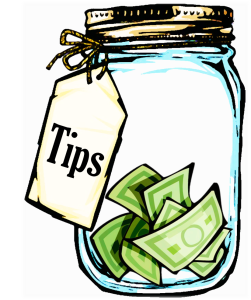At the Palouse Writers Guild Build-a-Book Workshop I presented the following information on ISBNs, copyright, and barcodes. The workshop was a success and we plan to host another one in the future.
Presentation PowerPoint: ISBN Presentation
What is an ISBN?
An ISBN is the International Standard Book Number. It uniquely identities the book, publisher, and edition. The purpose of the ISBN is to establish and identify one title (or edition) from one specific publisher, allowing for more efficient marketing by booksellers, libraries, universities, wholesalers and distributors.
Parts of the ISBN
Each 13 digit ISBN consists of 5 elements separated by spaces or hyphens.
The five parts of an ISBN (13) are as follows:
- The current ISBN–13 is prefixed by “978” or “979” indicating that the numbers which follow constitute an ISBN for a book.
- The single digit identifies a national or geographic grouping of publishers. In this example, the 1 indicates the book is part of the English language group of territories: US, UK, CA, AU, NZ.
- The third group of numerals identifies a particular publisher. 940313- is Inferno Publishing Company.
- The fourth set of numbers identifies a particular title or edition.
- The single digit at the end of the ISBN is a check digit which validates the ISBN.
It is possible to identify how many ISBNs a publisher purchased in that block. The numerals following the country code are always “692” with a single ISBN purchase. This applies even when purchased from CreateSpace. Blocks of 10 are likely a self-published author. Blocks of 100 may be a small publisher, and blocks of 1,000 or more are obviously a publisher.
Who needs ISBNs?
Authors who are not trying to place their books in stores, libraries, or with wholesales do not need an ISBN. However, if you plan to sell your book in bookstores, to libraries, or through online retailers like Amazon.com, you will need an ISBN. For digital imprints (ebooks and Kindle) ISBNs are not required, however they are recommended for ebooks.

What are my ISBN options?
- Free ISBNs
If you use a free ISBN the publisher of record for your book will be whoever issued the ISBN. That may be CreateSpace, Lulu, Draft2Digital, or Ingram Spark. Most readers don’t care about who issued the ISBN, or who is listed as the publisher of record, but bookstores do. Also, free ISBN’s are often limited to use with a specific publishing platform. - Custom Universal ISBN ($99)
This ISBN can be used with any publisher. The author can chose the book’s imprint of record and that imprint will be reflected on Amazon.com’s website in the book’s detail page. - Provide an ISBN Purchased from Bowker.
The book can be distributed through Amazon.com, Amazon’s European websites, an eStore, and some expanded distribution channels. Indies compete with traditional publishing on all fronts, so having ISBNs with a company listed as the publisher of record—not CreateSpace, Smashwords, or Lulu, give the book a more professional appearance.
How do I get an ISBN?
Bowker is the company responsible for ISBNs in the United States. (See ISBN website and Bowker’s website.) It is important to apply for an ISBN publisher prefix to identify and circulate books properly in the industry supply chain. It only takes 5 business days for non-priority processing of an ISBN. (From the date the application is received not from the date it was sent to the publisher.)
BEWARE of offers from other sources to purchase single ISBNs at special offer prices. These are unauthorized re-sellers and this activity is a violation of the ISBN standard and industry practice. Publishers with re-assigned ISBNs will not be correctly identified as the publisher of record in Books In Print or any of the industry databases. This can also result in a bit of embarrassment for a self published author whose book, The Adventures of Benjamin Bad Kitten, ends up with a house that specializes in erotica being listed as the publisher of record.
Can I get a free ISBN now and upgrade later?
Yes. But, switching ISBNs will impact the book’s sales ranking and reviews on the various vendor sites. Because the ISBN is your book, getting a new one after using one provided by a distributor will effectively start your book back at zero.
How many ISBN’s should I buy and what do they cost?
 The least economical choice is to buy a single ISBN. Each format, binding, or edition of a book must have a separate ISBN (i.e. hardcover, paperbound, e-book, audio book, etc). A single ISBN costs $125, while 10 ISBNs cost $295, 100 cost $575, and 1000 cost $1000. If an author only plans to publish one book, it’s wise to purchase a block of 10 ISBNs. If the intent is to publish multiple books, a block of 100 ISBNs would be a wise investment.
The least economical choice is to buy a single ISBN. Each format, binding, or edition of a book must have a separate ISBN (i.e. hardcover, paperbound, e-book, audio book, etc). A single ISBN costs $125, while 10 ISBNs cost $295, 100 cost $575, and 1000 cost $1000. If an author only plans to publish one book, it’s wise to purchase a block of 10 ISBNs. If the intent is to publish multiple books, a block of 100 ISBNs would be a wise investment.
Prior to publishing, a book’s ISBN needs to be registered with R.R. Bowker as the database of record for the ISBN Agency. After filling out the necessary forms on the Bowker website the book will be listed in Books in Print.
The ISBN information gets placed on the copyright page, included in the Cataloging-in-Publication data block (if you use one), and on the lower portion of the back cover of a book above the barcode. (See example.)
Is an ISBN the same as a barcode?
No. But ISBN’s can be translated into a compatible barcode format. A barcode is only necessary if you plan to sell your book in bookstores because barcode scanning is a required step for many retailers. Barcodes often contain information on the book’s price. Publishers who wish to have their ISBNs translated into worldwide compatible barcodes can make their request online at www.isbn.org or www.bowkerbarcode.com.
If I get an ISBN does that mean my work is copyrighted?
No. Obtaining an ISBN does not mean the book is copyrighted. A copyright is exclusive legal right to the creator of original works to print, publish, perform, or record literary works. Work is copyrighted the minute it’s created. However, to protect your copyright, it must be registered with the U.S. Copyright office, which costs $35. Copyright is administered by the Library of Congress and is an extension of intellectual property law.
What is a Library of Congress Control Number?
The Library of Congress assigns a number to every publication it will acquire. A LCCN can be requested by U.S. publishers prior to publication. Unlike a copyright, you do not have to pay to register the LCCN but the publisher must send a copy of the book to the Library of Congress upon publication.
The following types of books are ineligible for a LCCN:
- Previously published books
- eBooks (electronic books)
- Items under 50 pages, with the exception of genealogies and children’s literature
- Religious instructional materials
- Expendable educational materials: laboratory manuals, teachers’ manuals, programmed instruction test sheets, workbooks, activity books, etc.
- Transitory or consumable materials: trade catalogs, telephone books, calendars, coloring books, comic books, cutout books, etc.
- Translations, except Spanish
CreateSpace offers assistance in obtaining a LCCN for a $25.00 fee. They complete the LCCN application on your behalf and submit a copy of the book to the Library of Congress to be considered for cataloging. Be advised that the LCCN Assignment service must be purchased before approving the final proof. After the proof has been approved the book is no longer eligible.
Note: Submission for cataloging does not guarantee acceptance into the Library of Congress. To find out if you book has been cataloged check the Library of Congress Online Catalog.
What is a QR Code?
A Quick Response Code (QR Code) consists of black squares arranged in a square grid on a white background, which can be read by many cellphones. QR codes have become common in consumer advertising, since smartphone scanning can bring consumers directly to the author’s website. Bringing the reader directly to the author’s website can enhance loyalty marketing and make the reader feel like they are purchasing more than “just a book.”
If you’ve enjoyed this article, please leave me a tip. Tips from dedicated readers like you, supports my writing and makes free content, like this article, possible. Thanks!
Useful Links
Copyright Office
https://eco.copyright.gov/eService_enu/start.swe?SWECmd=Start&SWEHo=eco.copyright.gov
https://www.copyright.gov/docs/fees.html
ISBN.org Frequently Asked Questions
https://www.isbn.org/faqs_general_questions
https://www.myidentifiers.com/qrcode/main
Library of Congress Preassigned Control Number Program
https://www.loc.gov/publish/pcn/
LCCN Assignment
https://www.createspace.com/Services/LCCNAssignment.jsp
CIP: What It Means, How to Read It, Who Should Get It
https://www.thebookdesigner.com/2010/03/cip-what-it-means-how-to-read-it-who-should-get-it/
Publishing: Everything the Indie Author Needs to Know about ISBNs for Self-published Books
https://selfpublishingadvice.org/isbns-for-self-published-books/


I was looking at some of your articles on this website and I believe this is very instructive! Continue posting.
Thank you so much for the great article, it was fluent and to the point. Cheers.
My name is Alonzo… i had some of my writings copyrighted some years ago… now i cannot find my barcode, how do i retrieve it
great info!! question – better to get ISBN first or copyright first?
btw, I’ld be thrilled if you’d write a guest blog post for my site! My blog is for anyone who loves writing, books, and all the arts. If you think it might be fun or helpful to have my followers (who total about 10k across my various social media) meet you, here’s the link for general guidelines: https://wp.me/p6OZAy-1eQ
Everything starts with the ISBN, so authors need that first.
The ISBN is reported to the Library of Congress when applying for a LCCN. You need the ISBN to generate a barcode and it goes to the cover designer long before the book is launched.
Registering the copyright is the last thing an author does, because the copyright can’t be registered until the book is published. It’s best to have all the paperwork ready ahead of time, so you can wake up launch day and complete the online registration before you’re even out of your PJs.